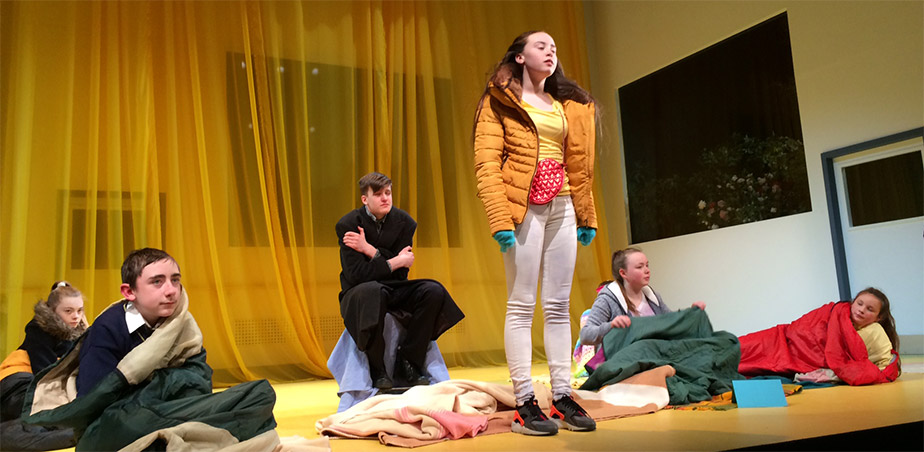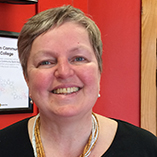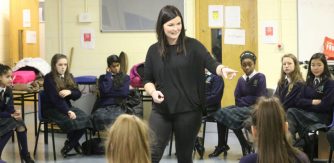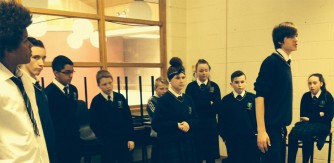Blog 1 – Máire O’Higgins, Teacher

Image (c) Abbey Theatre 2015

Máire O’Higgins is a teacher and an Assistant Principal at Larkin Community College Dublin 1. She also coordinates partnerships for the College and is the school Chaplain. Máire is 26 years working in the north east inner city. Before she became a teacher she worked as an actor and a Theatre Director.
Larkin Community College is a second level CDETB DEIS Band 1 school in the north east inner city of Dublin. It is a co-educational school with 430 students and a staff of 48. Students come from all over areas of socio-economic disadvantage in Dublin to attend the school. We are a mainstream school. We offer Arts, Soccer, Basketball and Academic Scholarship Programmes.
In the first of her blog series Máire discusses funding, partnership and documentation as part of the Theatre Making and Citizenship Programme with the Abbey Theatre.
October 25th 2016
I have the good fortune of working in a variety of jobs within my permanent teaching post over twenty six years. I worked in theatre before I switched to teaching so I carried my love of the creative engagement with me into teaching.
The school I am currently in has excelled at creative engagement since its inception in 1999. We have done some terrific work and also made some spectacular mistakes. I am learning to call them iterations! Isn’t that what educational entrepreneurship is all about, iterating and reiterating, planning, trying out, reflecting, trying again and on it goes. Isn’t that too what happens in the real world, the world after school ends?
From November this year to March 2017 we are working with the Gaiety School of Acting and the DLR Mill Theatre in Dundrum on a Theatre Making and Citizenship Manifesto Project. Larkin Community College has been doing Theatre Making and Citizenship programmes for three years now. The Theatre Making and Citizenship Programme model was developed with the College by Sarah Fitzgibbon and supported by Phil Kingston and his education team at the Abbey Theatre. This year we have a group doing the second part of the Theatre Making and Citizenship programme with the Abbey and a new Theatre Making Programme, which shares outcomes with the Abbey programme. This one is with the Gaiety School of Acting and the DLR Mill Theatre Dundrum.
Anna Kadzik-Bartoszewska of the Gaiety School of Acting has developed the project concept and guidelines. The project is called “The right to know”. It will look back at aspects of the education of young people from 1917. It will explore aspects of the education of young people in 2017. It will also look forward and imagine the future for education and young people in 2027. The project will focus on the creation of innovative play using the existing practice of “Manifesto”. Manifesto is an empowering style of theatre making that we hope will give our young people a voice to express their opinions and attitudes towards their own education that others have shaped for them. The project will be run by Michelle Fallon an English and History teacher in Larkin Community College. Michelle also coordinates the Arts Programmes for the College. I will support Michelle in her work and liaise with Anna and the Gaiety School of Acting, as well as other partners that may emerge as we work on the project.
The performances, developed by the students and teachers of Larkin Community College, the local community, older people from the Lourdes Day Care Centre for the Elderly in Sean Mc Dermott Street and arts professionals, will be the part of a conference on education planned for March 2017 at the DLRMill Theatre in Dundrum South Dublin. The conference hopes to feature speakers from Barnardos, Amnesty International, the Irish Human Rights and Equality Commission, the Department of Children and Youth Affairs, the Department of Education and Skills, the Arts Council of Ireland, other policy makers and interested parties. The conference will explore the theme of appropriate education for young people – looking at its different manifestations thematically and setting it within a global, national and local context.
During the conference students speakers will tell their stories through performances. Their theatre pieces will champion the contribution that young people make to society as young people in their own right and their entitlement to be heard on that basis.
This project will focus on theatre as a tool for raising awareness about issues that matter to young people, specifically around education. The project will also look at how theatre can motivate and move young people to action regarding human rights and issues in education that need to change.
Students’ stories will hopefully open up a dialogue between policymakers and professionals and will create an opportunity for everyone to ask questions, share experiences, and build connections.
Anna planned to hire artists through the Gaiety School of Acting, to work on the project. By the time Anna secured funding for the project, the lead artist that Anna had hoped we would work with – Liz Tyndall – was not able to commit to the project for the first month. Anna then brought in Gillian Mc Carthy to start the project. Both Liz and Gill are Drama and Theatre Teachers with the Gaiety School of Acting.
Michelle Fallon will work with the artists and 60 students. These students are on dedicated Arts programmes in the College as part of the Junior Cycle programme.
Anna’s team will work for one hour a week with three separate Arts groups. Our classes are one hour long and the project fits nicely into the hour long lessons.
The role of the Partnerships Coordinator / Liaison person for the school
My job is to check in with Michelle to see that she is happy with the way the project is going. My job is also to organise permission letters, transport and whatever timetabling needs emerge for the project, as well as to support Michelle as she works with the artists to create the Manifestos with students.
My role is to liaise with Anna too and make sure that the project aims and objectives reflect and fulfil Junior Cycle curriculum needs as well as other educational needs. In this regard my role is to source cross-curricular links that the project might connect with, particularly in English classes, Civic Social and Political Education (CSPE), Social, Personal and Health Education (SPHE) classes and Religion classes.
It is also my job to check in with all participants to see that they are enjoying themselves.
I usually manage the budgets for creative engagement projects in the school with the help of our school administrator Janet Rooney. Thanks to Anna too I don’t have the usual headache of paying the artists as Croke Park Community fund have agreed to pay the grant for the project directly to the GSoA. We have also applied for and received funding from Creative Engagement for the project. Creative Engagement is a Department of Education funded body and therefore the grant we receive from them will need to go directly to the school. Janet will manage the accounts and Michelle and I will decide with Anna, how the money will be spent.
As the project grows it will be my job to manage the calendar and communicate matters with the Principal of the school and inform staff of progress on the project.
I will also help Anna to build an invitation list for the Conference in March.
The role of the Principal
Our Principal Aoife Kelly Gibson is fully supportive of the project and loves the arts and culture. She trusts us to plan and deliver the project. This is important as she allows us great freedom to do the work.
Artists Schools Guidelines
I have asked Anna to ask her team to read the artists schools guidelines to help her team to have a sense of what we expect from the partnership engagement. The Artists Schools Guidelines were initiated by Lorraine Comer during her time in the Arts Council and developed in collaboration with teachers, policy makers, artists and young people. They form the framework for our planning meetings with all partners prior to starting a project in the school.
Garda vetting
The CDETB school we work in requires that all people working with young people in the College must be Garda vetted. This takes time to process so we put the paperwork in train as early as possible once we knew we had the funding for the project. Janet manages this for us.
Funding
Last year Anna along with Michelle Fallon and myself applied for Croke Park Community funding https://crokepark.ie/stadium/community/croke-park-community-fund and got it, for a 1916 project. The project was a great success.
Julianne Savage of the Croke Park Community Fund has kindly supported us for this project too, to the tune of €3000.
Dermot Carney the Director of Creative Engagement at www.creativeengagement.ie/ also funded this project to the tune of €1000. We have been lucky.
How does a school succeed in getting this amount of money for an arts in education initative?
For years we did creative engagement work without a budget and we built a reputation for doing good work that could be sustained. Then we applied over and over again for funding. We often didn’t succeed. We kept applying. I kept applying. I wrote the applications in my own time because I was passionate about the work I was doing. Sadly the regular school day does not allow time for teachers to spend time on the application process.
I found that by sticking with the application processes I got better at filling out forms and we eventually did succeed in getting funding.
I have learnt over the years to be careful with funding applications, to read carefully the questions that are being asked on the application and to respond appropriately. I learnt to make sure that (a) I could do and really wanted to do what I was promising that we could do (with flexibility for change built into the planning) and (b) that I had the time to manage the project or build in costs for a manager, or be as lucky as we are in Larkin on this project, to find a manager like Anna who takes care of the project as part of her brief as a partner on the project.
Partnership
I found that we need to know who our partners are when we decide to work together and to figure out what they expect from us and from the project as well as what it is we expect from them. I have learnt over the years that we need to work out what our aims and objectives and expected outcomes of the project are before applying for project funding. So often I have found that the partners on a project had different expectations to the ones we had in Larkin and it caused unease as we progressed. I have learnt to be clear and to articulate what we agree that all parties want, to check with the students that it is what they want, to build in the time to meet to discuss how things are going during the project and to address challenges as they arise. Communication is central to good partnership work and sustainable partnerships in education. We did a five year project with the education team at the National Museum of Ireland and I learnt so much about negotiating partners’ wishes, managing budgets and managing expectations. We were fortunate to work with an extraordinary team in education at the Museum, led by Lorraine Comer. The partners on the projects we engaged with over the five years were Poetry Ireland, NCAD, The Curriculum Development Unit, Macnas, Lourdes Day Care Centre for the Elderly, Localise as well as individual artists (Mikel Murfi, Helen Lane, Clare Muireann Murphy, Pete Casby), philanthropists and funders. It was a wonderful project that taught me a lot about how to develop and sustain meaningful partnerships in education for young people and teachers.
Documenting the work
Aghhh! During the planning process, we said we would look into photographing and videoing the work as we went along. We did get all students to sign a permission form to allow us to do this. For Child Protection reasons this is critical.
I forgot about the documentation process in the busy life of school. We will work on this going forward (November 23rd 2016).
Too often we have forgotten to document great work we have done. More accurately we have not had the time to do so. So much of theatre making is written in the sand. That is the nature of theatre work. It is like meditation! It is in the moment that we experience it. However documenting a project visually can provide lovely memories. It can also help with further funding applications. It has helped us in the past to explain models of good practice. It has helped us too to reflect on challenges that emerge.


